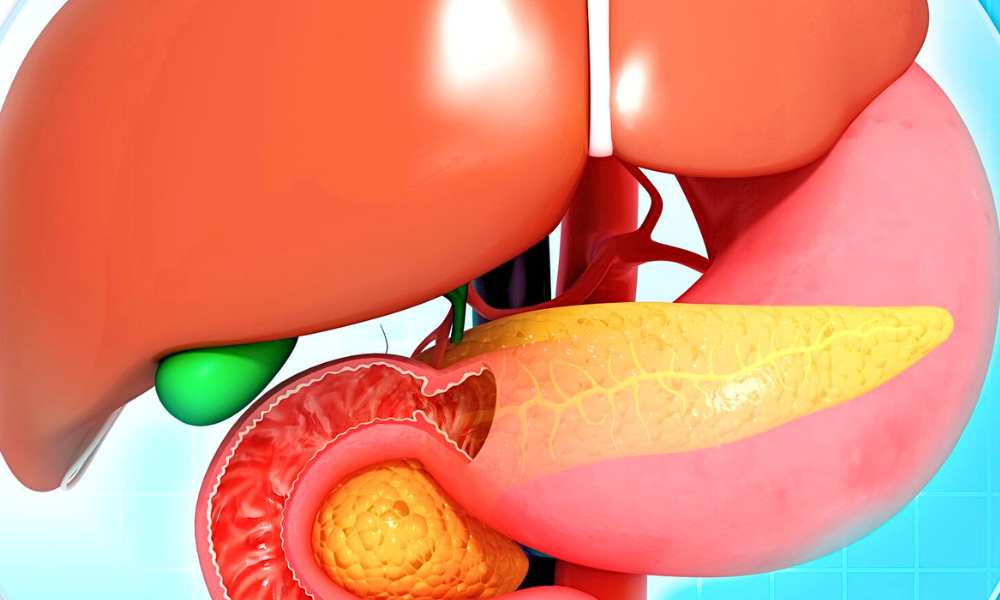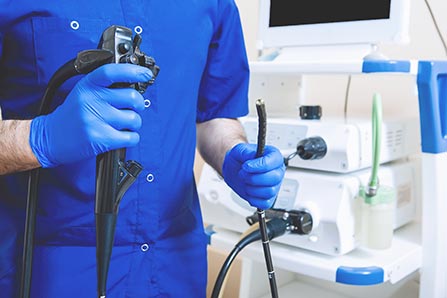News

High-quality screening colonoscopy for colon cancer makes a difference
A recent multi-center, randomized study published in the high-impact factor American Journal of Gastroenterology reported that a longer 9-minute mean examination time of the colon upon withdrawal of the endoscopic instrument increases the detection and reduces the miss rate of pre-cancerous polyps when compared to a 6-minute withdrawal time.
This study builds on what was previously known – that a more detailed and thorough endoscopic examination of the colon by well-trained specialists who place the focus of their endoscopic practice on international quality metrics rather than a quantity- and volume-driven practice makes a difference in important outcomes when screening for colon cancer with colonoscopy.
This supports our practicing philosophy at ELEVATE Gastroenterology, which aims to elevate the standards and quality of clinical and endoscopic practice; and elevate the gastroenterology care and service that our patients receive to levels that match and exceed best international standards and metrics.

Eating kiwis can help with constipation symptoms
A recent randomized study published in the high-impact factor American Journal of Gastroenterology reported that eating two kiwi fruits a day was associated with a clinically relevant increase in bowel motions and relief of abdominal discomfort in patients with functional constipation and constipation-predominant irritable bowel syndrome. The authors concluded that green kiwifruits are a suitable management strategy to relieve constipation and associated discomfort.
While this study on the effect of kiwi fruits on gut function was international and multi-center, it is perhaps not surprising that it was led by New Zealand researchers! It has long been known that an increase in dietary fiber, including fruits, can lead to improvement in constipation symptoms. Nevertheless, this study provides valuable original evidence that the consumption of fresh whole fruit, such as kiwi, can lead to measurable clinical improvement. Anecdotally, our patients in Singapore frequently give credit to eating prunes and papaya for achieving similar improvement. It remains to be scientifically proven whether papaya is as effective as kiwi!
Until then, at ELEVATE Gastroenterology, we recommend the consumption of any type of fruit which patients find enjoyable, affordable, and effective.

Patients with Barrett’s esophagus due to gastro-esophageal reflux disease (GERD) worry about cancer
A recent UK-based, multi-cohort, multi-center study of patients with dysplastic Barrett’s esophagus demonstrated high burdens of cancer worry across all stages of Barrett’s esophagus despite treatment or risk for progression. The authors concluded that their study findings highlight a need to improve health-related quality of life through education, reassurance and follow-up care.
Barrett’s esophagus is a precursor condition associated with esophageal cancer through progression of dysplastic phases. Barrett’s esophagus is a consequence of gastro-esophageal reflux disease (GERD). Irrespective of Barrett’s dysplastic stage and treatment, many patients in this study were still anxious and worried about cancer. The gold standard for the diagnosis and surveillance of Barrett’s esophagus is upper endoscopy (also known as gastroscopy or esophagogastroduodenoscopy – “OGD”). Prudent application of diagnostic, surveillance, and therapeutic upper endoscopy for appropriate indications, coupled with responsible education, can help provide reassurance and mitigate some of the anxiety and worry in patients with Barrett’s esophagus due to GERD.
At ELEVATE Gastroenterology, we strive to understand and meet our patients’ needs and worries through customized and individualized care.

Probiotics may be effective in patients with functional dyspepsia
In a single-center, randomized, double-blind pilot study, the effect of probiotics in patients with functional dyspepsia was studied as monotherapy or as adjunct therapy in patients on proton pump inhibitors (PPIs). The investigators recorded symptoms, immune activation and fecal microbiota. The primary endpoint was set as a decreased postprandial distress syndrome score of at least 0.7. The study found that the proportion of clinical responders was significantly higher with probiotics than placebo, with no significant increase in adverse events. Changes in immune activation were reported as more pronounced in patients on PPI. The authors concluded that probiotics were efficacious and safe in the treatment of functional dyspepsia, postulating a possible benefit for patients through immune and microbial changes.
Link:
https://www.thelancet.com/journals/langas/article/PIIS2468-1253(21)00226-0/fulltext
There is a dynamic and influential relationship between our diet and the gut microbiome. Through changes in immunity and the microbiome, probiotics have the potential to affect not only our digestion, but also our immune system, mood, and long-term health. While first-line therapy for functional dyspepsia is based on proton pump inhibitors (PPIs) for acid suppression, it has been suggested that probiotics may be efficacious in this group of patients due to effects on the altered small intestinal microbiome. This pilot study highlights the possible role of microbiota in the pathogenesis of functional dyspepsia. It also provides further evidence on the utility of probiotics in patients with certain types of functional dyspepsia.
At ELEVATE Gastroenterology, we aim to understand each patient’s individual digestive health profile and customize diagnostic and therapeutic approaches using the latest scientific principles and resources.

ERCP without X-rays for removal of gallstones?
A recent multi-center, prospective, randomized, controlled study compared traditional ERCP with fluoroscopy (X-rays) against fluoroscopy-free ERCP with direct cholangiography for removal of gallstones. The fluoroscopy-free ERCP utilized standard cannulation access techniques to enter the bile duct and then a biliary sphincterotomy (cut) was performed. Direct cholangioscopy with gallstone removal was then performed. If access to the bile duct remained difficult, additional advanced cannulation access techniques were allowed. “Brief” fluoroscopy was allowed during access attempts in some cases where cannulation remained difficult. Pure fluoroscopy-free direct cholangioscopy was successful in 89% of cases. However, 3 patients had persistent stone disease on confirmatory fluoroscopy. There was one complication episode with post-ERCP acute pancreatitis.
ERCP is a highly specialized endoscopic procedure, which utilizes endoscopy and fluoroscopy (X-rays) to treat gallstone problems in the bile ducts draining the gallbladder and the liver. In some patients, usually during pregnancy, minimizing or even avoiding the use of fluoroscopy is preferred.
Ten years ago, I presented the clinical study findings by our US-based academic advanced endoscopy group at the American College of Gastroenterology Annual Scientific Meeting in San Diego, California. Here, we shared our experience that the emergency use of fluoroscopy-free ERCP in critically ill patients in the intensive care unit was feasible and safe.
Given similar success with this approach for stone removal by other groups, there has been further interest over the years in expanding the use of fluoroscopy-free ERCP with additional techniques such as endoscopic ultrasound (EUS) and cholangioscopy. Pending further optimization of these techniques, however, some scepticism will remain regarding the safety of using advanced cannulation techniques (such as double guidewire, pre-cut, and transpancreatic septotomy, pancreatic stent placement) without fluoroscopy confirmation of correct guidewire placement.
For now, at ELEVATE GASTROENTEROLOGY, we take the approach that ERCP with judicious use of fluoroscopy remains the standard of care.

Cecal retroflexion on colonoscopy can improve polyp detection and reduce risk of colon cancer but is infrequently performed
This study sets the background by discussing that the detection of polyps depends on the quality of inspection. It reviews that inspection quality during colonoscopy varies among endoscopists. It is established that when the colonoscopy is performed by a specialist who spends more time on inspection for polyps, there is a lower likelihood of their patients developing colorectal cancer subsequently.1 Similarly, patients who undergo a colonoscopy by specialists who are able to detect more polyps are less likely to die of subsequent colorectal cancer.2
The study is a prospective observation trial performed at an academic medical center in the United States. It evaluated the inspection technique on colonoscopy used by endoscopists who had a certain minimum experience in performing annual screening colonoscopies. The procedures were recorded and then reviewed blindly. The study reported that cecal retroflexion is performed infrequently in routine practice, and the examination of the right colon in retroflexion is of poor quality. The study concluded that further education is required to educate endoscopists in optimal techniques to improve the quality of colonoscopy.
The detection of polyps during colonoscopy is a crucial part of colorectal cancer prevention. Therefore, a key focus of quality improvement in colonoscopy has been on improving the ability of endoscopists to detect colon polyps in order to reduce the incidence of colorectal cancer.
Colorectal cancer after colonoscopy is more likely to occur in the right colon,3partly because polyps in the right colon are more difficult to detect. Because of this difficulty, modalities such as multiple views of the right colon and cecal retroflexion have been proposed to improve polyp detection.4,5
The article highlights that some more complex or advanced colonoscopy maneuvers, such as retroflexion in the right colon and cecum, are infrequently and poorly performed, even at international tertiary academic centers in the United States. This is despite the potential improvement in quality of the inspection and polyp detection with such techniques. This may be due to a lack of familiarity, lack of training and supervision opportunities, or the perception of a higher risk of complications such as perforation.
I agree with the authors that further education is required to educate endoscopists in optimal techniques to improve the quality of colonoscopy. As an endoscopy trainer, I have strived to do my part by educating and training the new generation of gastroenterologists and endoscopists to integrate such techniques effectively and safely into their practice. Nothing gives me more satisfaction and pride than seeing many of my past trainees eventually elevating the quality of their endoscopy practice by confidently and independently applying these concepts and techniques.
At ELEVATE Gastroenterology, we are fully committed to the practice of endoscopy at the highest quality standards. Not only do we aspire to meet and exceed the highest quality metrics and standards in endoscopy, but we also strive to set, teach and elevate such standards.
REFERENCES
- Shaukat A, Rector TS, Church TR, et al. Longer withdrawal time is associated with a reduced incidence of interval cancer after screening colonoscopy. Gastroenterology. 2015;149:952–957.
- Corley DA, Jensen CD, Marks AR, et al. Adenoma detection rate and risk of colorectal cancer and death. N Engl J Med. 2014;370:1298–1306.
- Singh S, Singh PP, Murad MH, Singh H, Samadder NJ. Prevalence, risk factors, and outcomes of interval colorectal cancers: a systematic review and meta-analysis. Am J Gastroenterol. 2014;109:1375–1389.
- Kushnir VM, Oh YS, Hollander T, et al. Impact of retroflexion vs. second forward view examination of the right colon on adenoma detection: a comparison study. Am J Gastroenterol. 2015;110:415–422.
- Desai M, Bilal M, Hamade N, et al. Increasing adenoma detection rates in the right side of the colon comparing retroflexion or a second forward view: a systematic review. Gastrointest Endosc. 2018;89:453–459.
